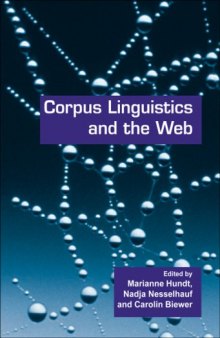 جزییات کتاب
جزییات کتاب
Using the Web as Corpus is one of the recent challenges for corpus linguistics. This volume presents a current state-of-the-arts discussion of the topic. The articles address practical problems such as suitable linguistic search tools for accessing the www, the question of register variation, or they probe into methods for culling data from the web. The book also offers a wide range of case studies, covering morphology, syntax, lexis, as well as synchronic and diachronic variation in English. These case studies make use of the two approaches to the www in corpus linguistics - web-as-corpus and web-for-corpus-building. The case studies demonstrate that web data can provide useful additional evidence for a broad range of research questions. Contents: Marianne HUNDT, Nadja NESSELHAUF and Carolin BIEWER: Corpus linguistics and the web Accessing the web as corpus: Anke LUEDELING, Stefan EVERT and Marco BARONI: Using web data for linguistic purposes William H. FLETCHER: Concordancing the web: promise and problems, tools and techniques Antoinette RENOUF, Andrew KEHOE and Jayeeta BANERJEE: WebCorp: an integrated system for web text search Compiling corpora from the internet: Sebastian HOFFMANN: From webpage to mega-corpus: the CNN transcripts Claudia CLARIDGE: Constructing a corpus from the web: message boards Douglas BIBER and Jerry KURJIAN: Towards a taxonomy of web registers and text types: a multidimensional analysis Critical voices: Geoffrey LEECH: New resources, or just better old ones? The Holy Grail of representativeness Graeme KENNEDY: An under-exploited resource: using the BNC for exploring the nature of language learning Language variation and change: Anette ROSENBACH: Exploring constructions on the web: a case study Günter ROHDENBURG: Determinants of grammatical variation in English and the formation / confirmation of linguistic hypotheses by means of internet data Britta MONDORF: Recalcitrant problems of comparative alternation and new insi



 دانلود کتاب
دانلود کتاب

 جزییات کتاب
جزییات کتاب





 این کتاب رو مطالعه کردید؟ نظر شما چیست؟
این کتاب رو مطالعه کردید؟ نظر شما چیست؟
